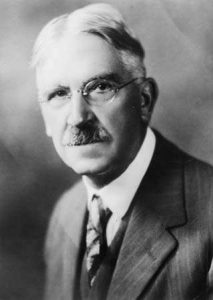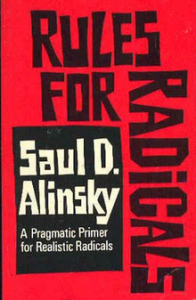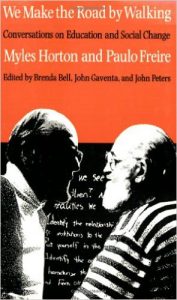To explore the principles of organizing and educating, we consider the work of four men from throughout the 20th century. In his 1927 essays “The Public and Its Problems,” philosopher John Dewey muses about the ways in which the public comes to exist as an entity and adapts over time. Saul Alinsky, in his 1971 “Rules for Radicals,” asserts his strong position on the proper structuring of organizations and their leaders. Myles Horton and Paulo Freire, both educators and organizers, come together in 1990 to examine issues of popular participation and freedom in their collaborative effort “We Make the Road by Walking.”



These men recognize that the processes of educating and organizing are fundamentally reciprocal, so thus ideas of social change must be approached with the probabilistic, experimental mindset inherent to scientific thinking. The mentality of the scientific method is one of experimentation, and this attitude allows the organizer to think of policies or theories in a flexible way, while respecting the stochastic nature of the world. This scientific way of thinking and seeking to explain the world is inherently cyclic, because gathering new data necessitates updating preconceived hypotheses. Dewey (1927) sees the applicability of this mindset to social science, stating “policies and proposals for social action [should] be treated as working hypothesis, not as programs to be rigidly adhered to and executed” (p. 362). Similarly, Alinsky (1971) argues that the organizer must not see the truth as relative, and therefore asserts that “curiosity becomes compulsive” for the organizer (p. 11). Both Dewey and Alinsky stress that the social scientist must abandon the idea of causality and instead accept both correlation and the underlying randomness that governs the universe.
The mindset of the scientific method demands that concepts be considered as part of a larger whole, the importance of which is demonstrated in the processes and outcomes of educating and organizing. Education and organizing are definably different ideas, yet are also inseparably linked in their goals, processes, and outcomes. In “We Make the Road by Walking,” Horton (1990) clarifies that the two are distinct, because, “solving the problem can’t be the goal of education,” but the goal of organizing can be “dealing with a specific project” (p. 119). He emphasizes that organizing implies a “specific, limited goal,” and the easiest way to accomplish that goal is the solution to the problem. With education, however, the problem might not actually be solved, but enlightening people through the process itself is enough to declare success (Horton, 1990, p.119). Even while illustrating differences between them, he continually stresses interconnectedness and refers to the process and outcomes of one impacting the other.
Within the reflective and cyclic framework of the scientific method, one is freed from the necessity of a linear progression between ideas and can instead appreciate entanglement and therefore reciprocity. The authors of “We Make the Road by Walking” take slightly different views, with Freire believing that “organizing educates,” and Horton instead emphasizing, “education makes possible organization” (p. 115). They don’t disagree, and neither is wrong – within a cyclic framework, it is entirely possible for each process to be a prerequisite of the outcome of the other. Educating the people is an outcome of organizing, but education is also the force driving people to organize. Constant reflection leads to shared consciousness and thus modification and adaptation of original objectives. These intrinsic ties prove growth is only possible within the flexible, reflective mindset of the scientific method.
References:
Alinsky, S. (1971). Rules for Radicals. New York: Random House.
Dewey, J. (1927). The Collected Works of John Dewey, 1882-1953: The Later Works of
John Dewey, 1925-1953: Volume 2: 1925-1927, Essays: The Public and Its
Problems. Electronic Edition. Retrieved from http://pm.nlx.com/.
Horton, M. & Freire, P. (1990). We Make the Road by Walking. Philadelphia, PA: Temple University Press.
Image Sources:
Left: https://www.britannica.com/biography/John-Dewey
Center: https://en.wikipedia.org/wiki/Rules_for_Radicals
Right: https://www.amazon.com/Make-Road-Walking-Conversations-Education/dp/0877227756
